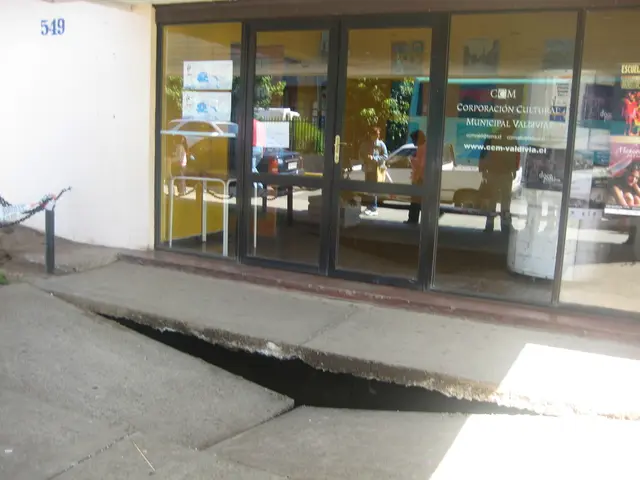Is the U.S. Slipping into Authoritarianism? A Closer Look
Slide towards authoritarian rule in the U.S.: Determining the extent of the shift.
Ponder this: the U.S., once known as a beacon of democracy, is now under scrutiny for its shifting political landscape. With President Donald Trump's Administration, the question on everyone's lips is, "Are we sliding towards autocracy?" Let's delve into the heart of the matter.
Trump's first months as president have been a whirlwind, causing alarm among scientists. The nation's democracy, once a bastion of freedom, now presents a disquieting picture. Some experts warn that the U.S. is already sneaking into an uncanny form of autocracy, as power shifts around them. But, can it find its way back?
In many aspects, the government under Trump has been a wolf in sheep's clothing, undermining the foundations of its democratic system. The executive branch has been taking a sledgehammer approach, breaking down once-sacred pillars like separation of powers, equal justice, and constitutional checks and balances.
So, are we already living in an autocracy? The answer is tricky, as it's easy to get lost in the barrage of government action. But, researchers have a tendency to agree: the U.S. is edging closer.
Let's consider this on a spectrum. At one end, lies a pure dictatorship; at the other, an ideal democracy. The United States, at the moment, teeters precariously closer to a mix called a 'competitive autocracy.' In these systems, elections still exist and democratic institutions persist, but the incumbents shrewdly manipulate rules to stay in power. Countries such as Hungary, Turkey, and Venezuela are stark examples.
The American public, along with over 700 scientists, share this grim view in a regular survey on political stability. After President Trump's first 100 days, the country plummeted from 67 to 49 on the scale of democracy, marking the lowest score since the survey began in 2017. Even during Trump's first term and after the events of January 6, 2021, the score rose but never dipped below 60.
The researchers use no less than 30 indicators to assess the state of democracy. For example, they gauge whether the government interferes with media freedom, suppresses political opponents, or whether Congress and the judiciary can effectively check executive power. According to these markers, the U.S. is not as distant from a dictatorship as its neighbor Mexico but is still distant from autocratic countries like Hungary.
The Role of Power Brokers
Remember those ominous words from historian Timothy Snyder, spoken back in February? He warned, "Of course it's a coup." He discussed the actions of billionaire Elon Musk and his team, who had gained access to U.S. agencies and sensitive databases. To Snyder, this was a coup because Musk had not been democratically elected, had no genuine claim to power, and was not sanctioned by any agency.
Though some of Trump's measures have been curtailed by courts, the changes made during his term are likely to remain. It's as if the elders in the house invited some tech-savvy kids over for a few months to mess around with their systems. Who knows what secrets were revealed, who copied data, who has access, and who'll misuse it?
For instance, a humongous database containing information on millions of migrants was created by combining data from various agencies, which the immigration authority ICE may well use to facilitate mass deportations. This raises concerns about human rights violations and abuses of power.
Justice, the Last Stand?
The resistance is primarily coming from the courts, who are standing firm in the face of immense pressure. Some decrees have already been nullified, others are being debated. However, the high cost of legal defense in the U.S. can crack resolve, as a frivolous lawsuit can often be enough to cow the opposition.
So far, Trump has predominantly relied on executive orders and executive action, leaving a large portion of control in the hands of future governments. Trump has signed very few bills into law during his term due to the Republicans lacking sufficient congressional majorities and the legislative gridlock.
The Future Ahead
Is the future bleak? It could be. Trump doesn't shy away from intimidating his opponents and changing the political landscape to make it easier for him and future Republican leaders to win elections and remain in power. This is the burning concern of the New York Times editorial board.
Experts suggest that Trump's administration has caused more damage to democracy in the U.S. than anything since the end of Reconstruction, which followed the Civil War in 1865. Trump, they claim, has been trying to wield unchecked power, void of the obstacles of Congress and the courts, bending and breaking the Constitution wherever possible.
The definition of democracy has always been fluid, and the future of the U.S. democracy rests on many factors. The consent of future leaders and their commitment to the principles of equality, freedom, and checks and balances will determine whether the U.S. will recover or continue its slide.
Sources:- ntv.de* Donald Trump* USA
Enrichment Data:
- Researchers analyze countries, including the United States, using various indicators to evaluate democratic backsliding and the emergence of competitive autocracy. Some key indicators include:
- Abuse of Power by Incumbents
- Restrictions on Political Freedom
- Money's Influence in Politics
- Influence on the Judiciary
- Polarization and Government Dysfunction
- Informal Forms of Authoritarianism
- For the U.S. specifically, there are noted declines in indicators such as:
- The Freedom House Index
- The Economist Democracy Index
- V-Dem Democracy Indices
- Assessments by International IDEA and Bright Line Watch
These metrics suggest a weakening of democratic governance in the U.S., though the nation remains distinct from authoritarian regimes like single-party dictatorships.
- The European Union, as a collective of democratic nations, might find interest in the ongoing political landscape of the United States, given its shifting towards autocracy under President Trump's Administration.
- Given the likelihood of the U.S. sliding towards a competitive autocracy, policymakers in the European Union could potentially devise a policy to address the growing concerns of autocracy in general-news, including war-and-conflicts and crime-and-justice.
- The European Union's WhatsApp groups and other communication platforms could enable the exchange of valuable information and strategies to combat the rise of autocracy, such as sharing research on democratic backsliding and the consolidation of power.
- In light of the developing political landscape in the U.S., European Union leaders may find it beneficial to engage with scientists and researchers to better understand the factors driving democratic backsliding, perhaps collaborating on legislation that strengthens democratic institutions worldwide.
- As the U.S. continues to edge closer to a competitive autocracy, European Union nations could raise awareness among their citizens about the importance of protecting democratic institutions, encouraging active participation in politics to maintain a balance of power and prevent the erosion of democracy.








